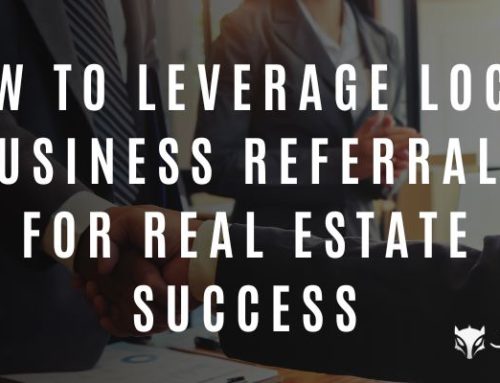In this episode, we explore the nuanced differences between fear and anxiety. Join special guest Ron Medved from the Pacific Institute, along with GO co-hosts Paige Ward, Howard Chung, and Jason Fox. They offer essential strategies for overcoming anxiety with a focus on creating and sharing video content. Tune in to uncover practical tips that remain relevant and effective in today’s digital communication landscape.
GREEN OCEAN WEEKLY REAL ESTATE PODCAST
HOSTED BY: HOWARD CHUNG, PAIGE WARD AND JASON FOX with special guest Ron Medved from the Pacific Institute

Overcoming Fear and Anxiety in Video Presentations and Public Speaking for Real Estate Professionals
Paige Ward:
Welcome to the Green Ocean Weekly podcast, a show to inspire current and aspiring leaders in real estate. I’m Paige Ward, your host today. As we begin episode four, this is actually a part two. Last week we had in line to talk about fear and anxiety, and because of the environment with Black Lives Matter, we felt it was critical to touch base on that. And this week we’re going to keep the fear and anxiety topic, but this week we’re going to apply it more to you and how you can get over that fear and anxiety when it comes to doing video and live presentations for your business.
So we’ve got some great tech tips coming up. We’ve got some great motivation and inspiration coming up. So I welcome you to today’s episode. And here we go.
Understanding Mindset in Business
Howard Chung:
I hear the word mindset all the time. Every time we talk about mindset, we kind of can’t not talk about growth mindset. For those people who don’t really understand.
Ron Medved:
That idea, growth mindset means continuous learning, does it not? You know, continuous learning. So fixed mindset means I don’t want to take risks, you know, with my learning because it hurts too bad. I decide what I know. I decide who I am, and, you know, I’m comfortable there.
Someone who has a growth mindset is someone who’s saying, I know I meant to grow. You know, I intend to grow all my life. One of the ways I’m going to grow best is learning from my mistakes. So I don’t want to make any, like, terrible mistakes, you know, that I’m going to feel that’s going to hurt me really bad, but I want to learn from, I want to stay adventuresome. I want to keep exploring, and, you know, if I make a mistake, I can learn from it.
Paige Ward:
So, Ron, do you think it is just a mindset that makes the difference between someone who gets to a certain point and then they just settle in and stay there versus someone who knows that there’s always more room to grow?
The Impact of Growth Mindset
Ron Medved:
And I think it comes from a core belief that is basically I was meant to grow. I have a lot of potential. I had potential as a kid. I had potential as a teenager. I had potential of early adult life.
I have potential to explore all my life as opposed to a limiting belief. Whatever my limiting belief is, is, you know, I didn’t come from family that had money, you name it. You know, we can come up with sort of a list of limiting beliefs, and once we hold those, we lock onto those, then we lock out, you know, the opportunities to grow.
Addressing Fear and Anxiety
Howard Chung:
I think there is this fine line between fear and limiting beliefs. And last week, we started to talk about changing the perspective of the word fear. Instead of using the word fear, it might be anxiety. Right. We’re anxious.
We have anxiety. And so anxiety is a different approach tactically than overcoming fear.
Ron Medved:
Yeah.
Howard Chung:
And so I think that’s one of the fine lines, is to kind of think through that bit where it’s just like, oh, I’ve got anxiety, I’ve got fear. Or is it I’ve got a limiting belief, you know, that I’m not able to do something, I’m not good at something, and that goes to self talk. And so I really feel like there’s some layers here that we’ve got to kind of address.
You know, I continued to think about this, Howard, and when I think about the fears in my life versus sort of the anxieties in my life, I mean, I can only really think about three or four times where I’ve really been scared, you know, and I mean scared for my life or, you know, the saber toothed tiger, you know, kind of scared. Everything else, you know, in the anxiety category for me now, we’re all different. We all have had different experiences in our life, and we’re having them. But, you know, when it comes to business, you know, when it comes to sales, I can be anxious about a cold call. I’m not afraid of the cold call.
I think there’s some mislabeling, and I think that there’s some redefinition. And I think that if we spend some time sort of redefining, you know, what’s going on with me when I have call reluctance, for example, what’s going on with me when I procrastinate, you know, and I creatively avoid, you know, reaching out to potential new clients.
Overcoming Video Anxiety
Jason Fox:
So one of the things I think is real timely right now is I say fear of, but maybe an anxiety of being broadcast, right. And be it the Facebook live, YouTube videos, this podcast, whatever I get really wound up on Facebook live videos, more so than even this podcast or anything else, because, you know, there’s no editing, and it’s, you know, it’s my friends or family. I just luckily just dive in and do it. But, yeah, a lot of people just are not able to do that right now, so how can we address that?
Ron Medved:
You know, one of the things that I’ve been doing is I’ve just been exposing myself to lots of opportunities to sort of watch other people do it. And as I learn how other people are doing it, I mean, one of the things that we’ve discovered is that, you know, it’s, it’s important to do that as a team.
Paige Ward:
I think it’s also okay to take baby steps. You know, it’s a little overwhelming sometimes when something is just too much. And if you just kind of start, like, I know for me, it was just participating, you know, as a, as an observer in zoom. And then I think I said an earlier episode that my knee jerk reaction when somebody said, let’s set up a meeting was like, okay, you send me an invite, you know, and then I realized, oh, I see what I’m doing. So then I needed to learn how to set it up myself.
And then it is, it’s just little bits, and it’s easier to digest in smaller bites. And so because I think sometimes we look at the big picture and it gets so overwhelming, we don’t do it at all.
Ron Medved:
The saving grace. The saving grace, you know, when you, you get on and go and do the best you can, is your authentic authenticity. You know, that is the thing that’s going to sort of carry you. That’s the thing that’s going to communicate with other people. So we, we’ve got to just really, if we affirm anything, you know, and if we have a belief in ourself about anything, it’s about being authentic.
Not perfect, but authentic.
Paige Ward:
So, Howard, I’m curious, because I know that you’re constantly trying new things. Do you have any techniques that you use that help you kind of get over that hump of that little bit of maybe whether you decide is this, am I afraid of something or I’m anxious about something? And how do I get past that?
Howard Chung:
And I learned early on that there are certain just phrases, ideas, concepts that I need to be able to articulate really well. And when I have certain go to phrases, then all of a sudden, all of the anxiety that I might have kind of go away because I’ve gotten certain ideas or concepts memorized. So, for example, if somebody says, how’s the market? I immediately have my go to conversations. I know what to say, how to say it.
I can talk about months of inventory. I could talk about interest rates. I can talk about the three p’s, presentation, promotion on price, which I’ve been teaching about so many years. So I am very confident in certain conversations. And so when it comes to video, whether it’s live or pre recorded, as long as I have got certain, I guess, go to phrases often I’m at a much more comfortable level.
So oftentimes I find that people don’t have those phrases. They’ve never really worked or practiced on, particularly how to articulate an idea or concept. But that’s part of sales. We need to understand how to do that. And so I think that is always a way to go to that will stay with you for years and years.
So I always kind of share, well, make sure you’ve, you know, practiced, but then what you’re practicing is at the end, end of that practice. They need to be clear. Your consumer has to be very clear. As far as, oh, I didn’t know that. I didn’t understand about price jumping or the fact that a lower interest rate can actually make a bigger impact on my monthly payment than just, you know, negotiating on the price of the house, for example.
So those are all ideas that I think are really helpful, is just to have some pre, you know, recorded thoughts, sales scripts that are our own. And of course, you know, when we do make it our own, sounds natural. We still sound authentic, but looks like you’re reading or you’re trying to think through it, then it comes across, of course, like, oh, you’re either salesy or it’s not authentic. And I think that is, that’s something we just have to practice.
Jason Fox:
That reminds me of Russell Wilson. The separation is in the preparation.
Ron Medved:
There you go.
Paige Ward:
I like that. That could be our inspirational quote for the week.
Jason Fox:
Thank you.
Ron Medved:
The secret, you know, for athletes, and it’s, and I think it’s the secret for business as well, is you just said it, Jason. It’s practice. You know, it’s not something that, you know, we want to avoid. But practice doesn’t necessarily make perfect, but practice makes you comfortable. And that’s what Howard was saying.
When you get in front of a client, you forget about the practice and you just sort of flow creatively, subconsciously, because, again, you’re going to be at your best when you’re, when you’re actually presenting subconsciously, but you can’t really get there unless you’ve put in the work before, you know, to practice.
Paige Ward:
Don’t you think it kind of goes back to that mindset again, too, where instead of saying, I have to practice, I get to practice, I get to practice, I love practice, I get to get better. You know, I have nothing to lose by practicing, but I have so much to potentially gain. So that’s kind of a fun way to look at things. You know, when you went to school and you had to do something, but then maybe you choose to go to college and you’re doing it by choice. It just seems more fun.
Everything’s more fun when, when you want to do it or get to do it rather than have to do it.
Ron Medved:
You know, Lou tice used to have a saying, and he would say this to himself, is like whenever he taught a seminar or whenever he gave a talk, it was always wonderful as far as I was concerned. I mean, he was a master, master teacher. But Lou would say, you know, every time I speak or every time I teach, it is what it is, but it’s also practice for the next time. So he considered everything that he did to be practiced.
Paige Ward:
You know, I like to pull some little quotes here occasionally, but here’s what I want to share, is that a river cuts through a rock not because of its power, but because of its persistence. And we can really, really parlay that into practice. Keep practicing, keep practicing, and pretty soon you’re going to have that breakthrough and you can get to where you want to be. That’s pretty exciting.
Practical Tips for Creating Video Content
Jason Fox:
You know, I’ve been doing videos and such for, for a long time. And, you know, actually, Howard and I started doing a video, YouTube video channel. Gosh, I don’t know, ten years ago, and it was before a lot of people were doing it. And I’m still probably not very great at videos, but, you know, that’s just a lot of practice. And I remember the first few, God, I couldn’t even watch them.
And, and you’re right, Ron. I would, I’d go home and it was a teaching moment. It’s like, okay, the next video that I’m going to do, I’m going to definitely change some things and, you know, and it just, you kind of keep at it and, and, you know, maybe it’ll never be my, my forte, but I’m comfortable and I, and I do them and, you know, people enjoy them and it’s just, you know, it’s just because I stick with it and kind of keep working on.
Ron Medved:
Yeah, I’ve noticed that I’ve gotten to a point now I want to improve and I, you know, I don’t want to have to suffer that, you know, like that. So what I’ve noticed myself doing is like the second time I go back and look at a video or the third time, I’m finding myself not paying attention to the glitches but paying attention to what I’m doing. Right. And that has been such an important turn for me. It’s so encouraging.
And then I can easily sort of, in my own mind, I can say the next time I get in a situation like that, I’m gonna do more of this, or I’m, or that’s a good turn of the phrase that I will use again. And so, and it’s really interesting. It’s, it’s like I’ve developed a blind spot, you know, to sort of the things that bothered me the most in the, you know, in the beginning.
Paige Ward:
I love that, Ron. And isn’t that there’s another mindset right there. Instead of looking for what’s wrong, look for what’s right. I mean, you can always improve on that, but you’re going to notice the stuff that you do wrong. It kind of tends to reveal itself pretty easily.
But isn’t it funny that we have to look a little harder for what’s right and make a conscientious decision to do that? And so that right there, I think, is key to moving forward with anything is start just changing the way you’re looking at it. Look for what’s right.
Ron Medved:
The negative has so much more of an impact on us than the positive, you know? So one of the reasons why that’s such a stumbling block for most of us is because if we get sort of a negative impression of ourselves or if we see ourselves making a mistake, you know, it hurts. And it hurts more than the positive. I mean, I think there’s a lot of study that I’ve been exposed to that says it as well. And the simple minded way to beat that is that you just got to have more positive experiences than negative experiences.
And so back to practice again. Back to thinking about what you’re doing right, and load up that positive side of the scale, because there’s always going to be those negatives there, and you have an unfair advantage to start with.
Jason Fox:
And Ron, you talk about negative self talk a lot. And I know that was, I think we talked about that last week, even. Just don’t say stupid stuff about yourself out loud. And, and I was like, oh, yeah, that’s a, that’s an easy way for me to remember, like, not doing negative self talk.
Howard Chung:
Jason, I’ve got our old video camera that we used back 13 years ago when we first started to do, you know, videos professionally, where we were editing them and doing all that before mobile phones could do that quality of video. But, um, one of the things I want to kind of bring us back on is the fact that oftentimes what’s happening when we have fear of video or anxiety of doing video or reaching out, especially on, like, Facebook live, for example, and there is going to be some of that anxiety. Obviously, it’s very similar to public speaking. People have. You know, what we’ve all heard so many times is that the number one fear that people have is of public speaking.
And when we are doing something like Facebook live and we have all these friends, all of a sudden, it’s as if we are doing public speaking.
Ron Medved:
Yeah.
Howard Chung:
And so there’s this natural association, I think, with doing something like video and reaching out and things of that nature with public speaking. And so we’ve got to kind of have some of these tactics. I think routine is a great one where we are basically saying, oh, if I do this routine today, then it won’t seem so tedious. I’ve got less time for my brain to have anxiety about it because it’s just one of my routines. Of course, I communicate with all the people that I care about, whether it’s one on one or in groups by Zoom.
But that’s absolutely got to be one of the. I guess the tactics is we use routine to kind of overcome that anxiety.
Ron Medved:
One of the way to sort of reduce your anxiety is to come back inside of today. In other words, a lot of times we have anxiety about the future. And one of the ways to calm yourself down immediately is to say, come on back inside today. And now that I’m inside today, what, you know, not. Not what do I have to worry about, but what, you know, what do I need to pay attention to, you know, and this is back to neutral thinking.
And neutral thinking is, you know, you have positive thinking and negative thinking, but neutral thinking is, what can I do right now? What is it today that I can do? I am not going to be a master of video today, but there’s something that I can do today. Take a step in that direction. Right.
So it’s back to the small steps page, you know, which. Which you said. But you keep in control of what you have control over, and you have control over today.
Paige Ward:
Okay, Jason, we’ve been really looking forward to this week’s tech tip. What have you got?
This Week’s Tech Tip
Jason Fox:
Well, just real quickly, you know, I think being prepared when you do want to hit that Facebook live or if you do want to go ahead and start a video, one of the things that I like to have with me is a portable tripod of some sort. They come in all kinds of different sizes and shapes, and, you know, you could probably get one on Amazon for as low as $10. I currently use a little clip on type version with bendable arms, and one holds my phone, and the other one’s got a little ring light. So no matter where I am, I can always shine a little light and look my best.
Howard Chung:
You know, what’s an important part about what you just shared, Jason, is that a lot of people have heard that tech tip before. Like, you should get a tripod. You get a little ring light, but they actually haven’t ordered one.
Paige Ward:
Right.
Howard Chung:
And so what happens is that when you actually get the ring light, when you actually get the tripod, it kind of forces us to dive in a little bit deeper into that technology, into. Okay, now I’ve got fewer excuses. Now I actually have a light. Now I’ve got a tripod. I played around with it.
A lot of them even come with a little Bluetooth remote control. So I really don’t have a reason or less of a reason to go ahead and do this. And I think, like, we’re talking about the affirmations and some of that positive and even neutral thinking, what can we do today? Well, what I can do today is order a couple of these things, and it’ll kind of force me to practice like we were talking about. It’ll force me to go ahead and try this out, and then I’m going to be that much more comfortable.
And here’s the thing. Most real estate professionals still will not order a tripod and a ring light. Right? And so that’s something I can do today. It’s a small investment.
I’m going to practice it. I’m going to get better at it. And I think that’s just a great tech tip.
Paige Ward:
You know, I think, never forget the support of your friends and family. Record something really quick and send it to them. You know, just so you get used to that. And seeing yourself, I think so often.
Howard Chung:
We just think about the fact that, oh, I’ve got to be so articulate. Well, one thing, you shouldn’t ramble too long about any one topic. We’ve all seen that. However, what about just a simple birthday message? It’s somebody’s birthday today, right?
Howard Chung:
And I know that we’ve all heard this, and maybe we’ve even done it once or twice, but on a regular basis, just check on Facebook. Whose birthday is it today? Oh, it’s three people’s birthdays today. Why don’t I, instead of just typing in happy birthday, like, you know, 99% of what everybody else knows, I can just say, hey, just want to give you a birthday blessing. So I always like to do those birthday blessings, you know, and just share a little something in terms of from my heart, why I care for them, and what I hope for them in the coming year.
Conclusion
Paige Ward:
Thank you so much for joining us. We hope that you were inspired by today’s show. Be sure to sign up for your free trial of greenoceantv.com, learn from master level industry experts and complete the all important go actions. Go actions help you and your team execute effective tasks in business and life each and every week. Thanks again for joining us and we’ll see you again soon.






Leave A Comment